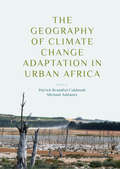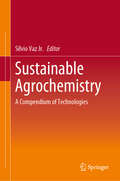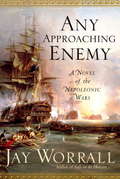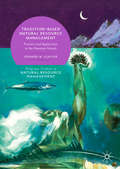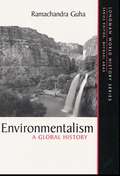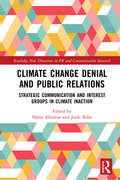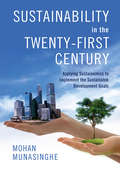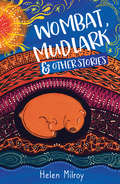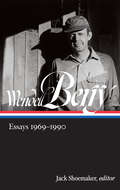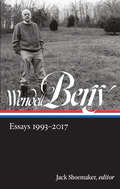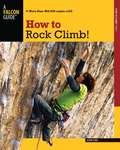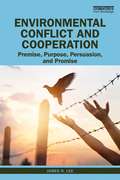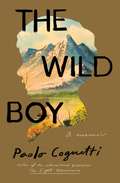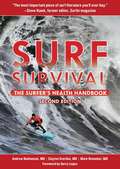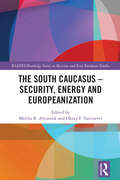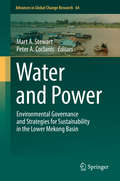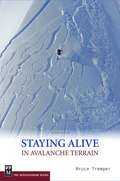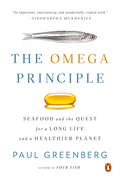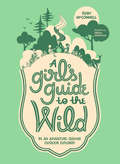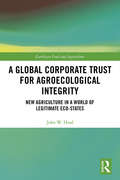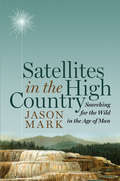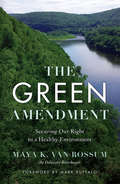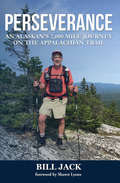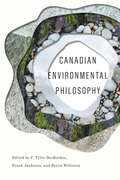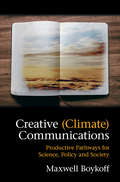- Table View
- List View
The Geography of Climate Change Adaptation in Urban Africa
by Patrick Brandful Cobbinah Michael AddaneyThis book take a comprehensive look at several cases of climate change adaptation responses across various sectors and geographical areas in urban Africa and places them within a solid theoretical context. Each chapter is a state-of-the-art overview of a significant topic on climate change adaptation in urban Africa and is written by a leading expert in the field. In addition to the focus on the geography of urban adaptation to climate change in Africa, this collection offers a broader perspective by blending the use of case studies and theory based research. It examines transformations in climate change adaptation and its future orientation from the perspectives of urban planners, political economists, environmentalists, ecologists, economists and geographers, thereby addressing the challenges facing African cities adaptation responses from all angles. Providing up-to-date and authoritative contributions covering the key aspects of climate change adaptation in urban Africa, this book will be of great interest to policymakers, practitioners, scholars and students of geography, urban development and management, environmental science and policy, disaster management, as well as those in the field of urban planning.
Sustainable Agrochemistry: A Compendium of Technologies
by Sílvio Vaz Jr.This book presents a broad range of technologies for sustainable agrochemistry, e.g. semiochemicals for pest management, nanotechnology for release of eco-friendly agrochemicals, and green chemistry principles for agriculture. It provides a concise introduction to sustainable agrochemistry for a professional audience, and highlights the main scientific and technological approaches that can be applied to modern agrochemistry. It also discusses various available technologies for reducing the negative impacts of agrochemicals on the environment and human health.
Any Approaching Enemy: A Novel of the Napoleonic Wars
by Jay WorrallWith the stunning high-seas adventure Sails on the Horizon, Jay Worrall introduced a bold new hero in the rousing tradition of Jack Aubrey: Charles Edgemont, an ambitious officer in His Britannic Majesty's navy. Raised to the rank of captain for gallantry under fire, Edgemont proved his mettle in the bruising British victory over the Spanish fleet at the Battle of St. Vincent. Now married and in command of the twenty-eight-gun frigate Louisa, the young captain sails toward a day of destiny-for himself and for England. The year is 1798. The war between England and revolutionary France has reached a bloody stalemate, with England in the ascendancy at sea and France unchallenged on the Continent, thanks in large part to an unorthodox twenty-eight-year-old general named Napoleon Bonaparte. But the French, secretly amassing a powerful fleet, mean to break the impasse. When rumors of the French preparations leak, the Admiralty dispatches a squadron of seven ships-among them the Louisa-under the command of Rear Admiral Horatio Nelson to investigate. Blindsided by a storm of ferocious intensity, the ships scatter across the seas. After the storm subsides, the damaged frigates limp back to the rendezvous point. But there is no sign of Nelson's flagship, Vanguard, nor of two other ships of the line. Edgemont fears that the pugnacious rear admiral has pressed on with the mission. Putting his career on the line by disobeying direct orders, Edgemont sets out in pursuit of Nelson and the French fleet on a treacherous voyage along the Tuscan coast. As tensions among the crew threaten to explode into open insubordination or worse, Edgemont makes an unexpected discovery in Naples that may seriously compromise his mission. When the missing French fleet turns up off the shores of Egypt, conveying an army tens of thousands strong, Edgemont is suddenly thrown into a crisis of conscience. As circumstances grow dire and require heroic action, the fate of the crucial battle effectively lies in Edgemont's hands-as does the course of history. From the Hardcover edition.
Tradition-Based Natural Resource Management: Practice and Application in the Hawaiian Islands (Palgrave Studies in Natural Resource Management)
by Edward W. GlazierThis book addresses the complex socio-political context of natural resource management in coastal and marine environments throughout the contemporary Pacific Islands and provides lessons that can be applied around the globe. The author spotlights one particular case in which Native Hawaiians worked successfully to develop a formal policy mechanism through which to advise government agencies in the State of Hawaii on matters regarding traditional and customary use and management of the island’s natural resources. Glazier describes historic-traditional aspects of natural resource use and management in the Hawaiian Islands and the challenging process that was employed to enhance the capacity of modern Hawaiians to influence the course of their future. This process successfully broached and addressed truly difficult challenges, including but not limited to: the convening of representatives of a complex society of indigenous persons in order to elicit traditional place-based knowledge and varying perspectives on the appropriate use and management of natural resources; the incorporation of such knowledge and perspectives into the modern natural resource management and policy context; and the need to balance the interests of indigenous persons and those of more recently-arriving persons around the island chain. The lessons learned were many and varied and are particularly germane for resource managers, scientists, policymakers, and indigenous persons seeking to undertake balanced natural resource policy decisions in island, coastal, and indigenous settings around the Pacific and beyond.
Environmentalism: A Global History
by Ramachandra GuhaA new entry in the Longman World History Series, Environmentalism: A Global History is perfect for professors who want to assign short topical paperbacks which explore global issues and movements in their world history classes. This volume will fit into the second half of World History courses which typically cover the period from 1500 to the present century. Environmentalism: A Global History is the first genuinely global history of environmentalism. Written by one of the foremost thinkers on ecological issues relating to South Africa, Guha has become one of the more provocative and perceptive commentators on environmentalism in its cross-cultural and global dimensions. Students will find this new text to be a lively and engaging study of ideas and debates that are central to our lives in the twentieth-first century.
Climate Change Denial and Public Relations: Strategic communication and interest groups in climate inaction (Routledge New Directions in PR & Communication Research)
by Núria Almiron Jordi XifraThis is the first book on climate change denial and lobbying that combines the ideology of denial and the role of anthropocentrism in the study of interest groups and communication strategy. Climate Change Denial and Public Relations: Strategic Communication and Interest Groups in Climate Inaction is a critical approach to climate change denial from a strategic communication perspective. The book aims to provide an in-depth analysis of how strategic communication by interest groups is contributing to climate change inaction. It does this from a multidisciplinary perspective that expands the usual approach of climate change denialism and introduces a critical reflection on the roots of the problem, including the ethics of the denialist ideology and the rhetoric and role of climate change advocacy. Topics addressed include the power of persuasive narratives and discourses constructed to support climate inaction by lobbies and think tanks, the dominant human supremacist view and the patriarchal roots of denialists and advocates of climate change alike, the knowledge coalitions of the climate think tank networks, the denial strategies related to climate change of the nuclear, oil, and agrifood lobbies, the role of public relations firms, the anthropocentric roots of public relations, taboo topics such as human overpopulation and meat-eating, and the technological myth. This unique volume is recommended reading for students and scholars of communication and public relations.
Sustainability in the Twenty-First Century: Applying Sustainomics to Implement the Sustainable Development Goals
by Mohan MunasingheIn applying the innovative 'sustainomics' framework and identifying the balanced inclusive green growth (BIGG) path to achieve sustainability, this book provides a rigorous and practical analysis of sustainable development today. Developed and applied globally over the past twenty-five years by world renowned multi-disciplinary expert Mohan Munasinghe, sustainomics gives us an optimistic message: although our problems are serious, we can respond effectively by making development more sustainable, but only if we begin immediately. Sustainomics shows us the first practical steps in making the transition from the risky business-as-usual scenario to a safe and sustainable future for all. Some key features include: an explanation of the key principles of sustainomics, free of technical jargon; empirical case studies that are practical and policy-relevant over a wide range of time scales, countries, sectors, ecosystems and circumstances; annexes that provide mathematical and additional details; and an extensive and up-to-date bibliography to aid further research.
Wombat, Mudlark and Other Stories
by Helen MilroyFrom a falling star to a lonely whale, an entertaining lizard to anenterprising penguin, these Indigenous stories are full of wonder,adventure and enduring friendships. Told in the style of traditionalteaching stories, these animal tales take young readers on adventures ofself-discovery and fulfilment.
Wendell Berry: Essays, 1969-1990 (Library of America Wendell Berry Edition #2)
by Wendell BerryThe first volume of the Library of America's definitive two-volume selection of the nonfiction writings of our greatest living advocate for sustainable culture.Writing with elegance and clarity, Wendell Berry is a compassionate and compelling voice for our time of political and cultural distrust and division, whether expounding the joys and wisdom of nonindustrial agriculture, relishing the pleasure of eating food produced locally by people you know, or giving voice to a righteous contempt for hollow innovation. He is our most important writer on the cultural crisis posed by industrialization and mass consumerism, and the vital role of rural, sustainable farming in preserving the planet as well as our national character. Now, in celebration of Berry's extraordinary six-decade-long career, Library of America presents a two-volume selection of his nonfiction writings prepared in close consultation with the author. This first volume collects thirty-three essays from nine different books, including his first, The Long-Legged House (1969), What are People For? (1990), with its still provocative essay "Why I am Not Going to Buy a Computer," and the complete text of his now classic The Unsettling of America (1975), whose argument about the enormous ecological, economic, and human costs of industrial agriculture has, as the author notes, "not had the happy fate of being proved wrong."Berry's essays remain timely, even urgent today, and will resonate with anyone interested in our relationship to the natural world and especially with a younger, politically engaged generation invested in the future welfare of the planet.INCLUDES: The Unsettling of America AND SELECTIONS FROM The Long-Legged House The Hidden Wound A Continuous Harmony Recollected Essays The Gift of Good Land Standing by Words Home Economics What Are People For?LIBRARY OF AMERICA is an independent nonprofit cultural organization founded in 1979 to preserve our nation’s literary heritage by publishing, and keeping permanently in print, America’s best and most significant writing. The Library of America series includes more than 300 volumes to date, authoritative editions that average 1,000 pages in length, feature cloth covers, sewn bindings, and ribbon markers, and are printed on premium acid-free paper that will last for centuries.
Wendell Berry: Essays 1993-2017 (Library of America Wendell Berry Edition #3)
by Wendell BerryThe second volume of the Library of America's definitive two-volume selection of the nonfiction writings of our greatest living advocate for sustainable culture.Writing with elegance and clarity, Wendell Berry is a compassionate and compelling voice for our time of political and cultural distrust and division, whether expounding the joys and wisdom of nonindustrial agriculture, relishing the pleasure of eating food produced locally by people you know, or giving voice to a righteous contempt for hollow innovation. He is our most important writer on the cultural crisis posed by industrialization and mass consumerism, and the vital role of rural, sustainable farming in preserving the planet as well as our national character. Now, in celebration of Berry's extraordinary six-decade-long career, Library of America presents a two-volume selection of his nonfiction writings prepared in close consultation with the author. In this second volume, forty-four essays from ten works turn to issues of political and social debate--big government, science and religion, and the meaning of citizenship following the tragedy of 9/11. Also included is his Jefferson Lecture to the National Endowment for the Humanities, "It All Turns on Affection" (2012). Berry's essays remain timely, even urgent today, and will resonate with anyone interested in our relationship to the natural world and especially with a younger, politically engaged generation invested in the future welfare of the planet.INCLUDES: Life is a Miracle AND SELECTIONS FROM Sex, Economy, Freedom & Community Another Turn of the Crank Citizenship Papers The Way of Ignorance What Matters? Imagination in Place It All Turns on Affection Our Only World The Art of Loading BrushLIBRARY OF AMERICA is an independent nonprofit cultural organization founded in 1979 to preserve our nation’s literary heritage by publishing, and keeping permanently in print, America’s best and most significant writing. The Library of America series includes more than 300 volumes to date, authoritative editions that average 1,000 pages in length, feature cloth covers, sewn bindings, and ribbon markers, and are printed on premium acid-free paper that will last for centuries.
How to Rock Climb, (How to Climb Series)
by John LongThoroughly revised and updated to reflect the modern standards of equipment, technique, and training methods, this guide includes sections on face climbing; crack climbing; ropes, anchors, and belays; getting off the rock; sport climbing; and much more. It is the essential how-to book for rock climbers everywhere.
Environmental Conflict and Cooperation: Premise, Purpose, Persuasion, and Promise
by James R. LeeEnvironmental Conflict and Cooperation explores the evolution of environmental conflict as a field of research and the study of cooperation as an alternative to war. Over four key parts, James R. Lee navigates the contours of this growing field and paints a vivid framework for better understanding issues around environmental conflict and security: • The premise of the field and its historic manifestations • The definition and purpose of research • The persuasions or types of environmental conflict and cooperation • The promise of research in leading to better decision-making and to broaching new challenges. Over the course of these parts, the author outlines the deep historic record of this discipline, arguing that it will play a key role in understanding important future trends. Utilizing a wide variety of case studies that range from ancient examples, including conflict over the Cedars of Lebanon and the role of tin in the Peloponnesian Wars, to future-oriented scenarios, including expanded island-building in the South China Sea and the global politics of geo-engineering, Lee highlights key concepts, metrics, and policy contexts that will test current understandings. He also examines a variety of research methods and provides examples of the ways in which such research can be used to inform policy improvements. This book will draw specific interest from students and scholars of environmental conflict and cooperation, as well as researchers of environmental politics and security studies.
The Wild Boy: A Memoir
by Paolo CognettiA young man escapes his painful past by retreating to the rustic comfort of the Italian Alps in this gorgeously wrought memoir from the internationally bestselling author of the “exquisite” (Annie Proulx) novel The Eight Mountains.When life in the city becomes too overwhelming for Paolo, he decides to take refuge high in the Italian mountains. Returning to the breathtaking Valle d’Aosta—known for its snowcapped mountain peaks—after a decade’s absence, he rediscovers a simpler life and develops deep human connections with two neighbors. In this stunning landscape, he begins to take stock of his life and consider what he truly values. With lyrical and evocative prose, The Wild Boy is a testament to the power of the natural world, the necessity of an ever-questioning mind, and the resilience of the human spirit.
Surf Survival: The Surfer's Health Handbook
by Andrew Nathanson Clayton Everline Mark RennekerThree expert physicians/surfers trained in emergency medicine, sports medicine, and family medicine explain everything you need to know to stay safe in the water. Whether you’re a novice or an expert, an SUPer or a bodyboarder, Surf Survival is the only book that every surfer must have in his or her backpack, car, and beach house. This practical handbook explains everything from how to reduce a shoulder dislocation to understanding waves and currents, from how to treat jellyfish stings to how to apply a tourniquet. Whether you are surfing a crowded beach in California or a remote island in Indonesia, be prepared to handle surfing-related emergencies from hypothermia and drowning to wound care and infections. Topics include: • Fitness for surfers • Prevention and rehabilitation of common overuse injuries • Wilderness first aid • Surviving the sun • Surf-travel medicine • Surviving big surf • SUP • Surfer's ear • And much, much more! Written by three expert physician surfers, packed with color photos and illustrations, this is the authoritative medical guide for surfers and watermen.
The South Caucasus - Security, Energy and Europeanization (BASEES/Routledge Series on Russian and East European Studies)
by Meliha B. Altunışık Oktay F. TanriseverThis book explores developments in the countries of the South Caucasus – Armenia, Azerbaijan and Georgia – since the EU included the region in the European Neighbourhood Policy in 2003. It considers issues related to energy, ethnic conflict, steps towards regional integration, and, above all, security – including the involvement of Russia, Iran, Turkey and the United States. It assesses the key importance of energy, argues that the prospects for regional integration are weak, and contends that while the approach of Europe and the United States has been confused and weak, not holding out great hope of EU or NATO membership, Russia’s interest and involvement in the region is strong, and growing.
Water and Power: Environmental Governance And Strategies For Sustainability In The Lower Mekong Basin (Advances In Global Change Research #64)
by Peter A. Coclanis Mart A. StewartThis book brings together a talented international group of scholars, policy practitioners, and NGO professionals that explores a range of issues relating to environmental, developmental, and governing challenges on the Mekong, one of the world’s greatest rivers and, alas, one of the most endangered. <p><p> The book is divided into three sections devoted in turn to historical perspectives on the Lower Mekong Basin. Issues relate to livelihood strategies, environmental threats, and adaptation strategies; and various aspects of river governance, with individual authors treating questions of governance at different levels of refraction and in different registers. The result is a fresh and innovative collection of essays, which, taken together, provide much-needed new perspectives on some of the most important and seemingly intractable environmental and development issues in contemporary Asia.
Staying Alive in Avalanche Terrain
by Bruce TremperWinter recreation in the backcountry has increased steadily over the years and so has the number of deaths and injuries caused by avalanches. As search and rescue teams are increasingly strapped for funding, self-education has become a larger necessity for snow-sport enthusiasts. The new edition of Bruce Tremper's seminal book is organized according to the structure of American Avalanche Association classes and all chapters have been updated and reviewed by peer experts.
The Omega Principle: Seafood and the Quest for a Long Life and a Healthier Planet
by Paul GreenbergBy the bestselling author of Four Fish and American Catch, an eye-opening investigation of the history, science, and business behind omega-3 fatty acids, the "miracle compound" whose story is intertwined with human health and the future of our planetOmega-3 fatty acids have long been celebrated by doctors and dieticians as key to a healthy heart and a sharper brain. In the last few decades, that promise has been encapsulated in one of America's most popular dietary supplements. Omega-3s are today a multi-billion dollar business, and sales are still growing apace--even as recent medical studies caution that the promise of omega-3s may not be what it first appeared. But a closer look at the omega-3 sensation reveals something much deeper and more troubling. The miracle pill is only the latest product of the reduction industry, a vast, global endeavor that over the last century has boiled down trillions of pounds of marine life into animal feed, fertilizer, margarine, and dietary supplements. The creatures that are the victims of that industry seem insignificant to the untrained eye, but turn out to be essential to the survival of whales, penguins, and fish of all kinds, including many that we love to eat.Behind these tiny molecules is a big story: of the push-and-pull of science and business; of the fate of our oceans in a human-dominated age; of the explosion of land food at the expense of healthier and more sustainable seafood; of the human quest for health and long life at all costs. James Beard Award-winning author Paul Greenberg probes the rich and surprising history of omega-3s--from the dawn of complex life, when these compounds were first formed; to human prehistory, when the discovery of seafood may have produced major cognitive leaps for our species; and on to the modern era, when omega-3s may point the way to a bold new direction for our food system. With wit and boundless curiosity, Greenberg brings us along on his travels--from Peru to Antarctica, from the Canary Islands to the Amalfi Coast--to reveal firsthand the practice and repercussions of our unbalanced way of eating.Rigorously reported and winningly told, The Omega Principle is a powerful argument for a more deliberate and forward-thinking relationship to the food we eat and the oceans that sustain us.
A Girl's Guide to the Wild: Be an Adventure-Seeking Outdoor Explorer! (A Girl's Guide to the Wild)
by Ruby McConnellGirls belong outdoors! This handbook covers everything you need to get outside, including ideas for what to do, camping and hiking basics, body stuff in the wilderness, advanced skills like maps, weather, and first aid, as well as recipes, projects, activities, and profiles of inspiring outdoorswomen.Your definitive guide to getting outside--for girls ages 9-12! In addition to basic outdoor skills, this entertaining guidebook includes easy camping recipes, outdoor projects including science experiments and crafts, fun activity suggestions, and inspiring stories of diverse historical and contemporary outdoorswomen (such as Arunima Sinha, the first amputee woman to summit Mount Everest; Juliette Gordon Low, founder of the Girl Scouts; and Libby Riddles, first woman to win the Iditarod). The goal is to improve the quality of girls' outdoor time by increasing participation and independence, making them feel comfortable and safe, and giving them essential skills and knowledge. Charming and approachable, this book will encourage both reluctant campers and budding naturalists to go wild and embrace the outdoors.
A Global Corporate Trust for Agroecological Integrity: New Agriculture in a World of Legitimate Eco-states (Earthscan Food and Agriculture)
by John W. HeadThis book examines global environmental governance and how legal, institutional, and conceptual reform can facilitate a transformation to a new ‘natural-systems’ form of agriculture. Profound global climate disruption makes it essential that we replace our current agricultural system – described in this book as a fossil-carbon-dependent ‘modern extractive agriculture’ – with a natural-systems agriculture featuring perennial grains growing in polycultures, thereby mimicking the natural grassland and forest ecosystems that modern extractive agriculture has largely destroyed. After examining relevant international legal and conceptual foundations (sovereignty, federalism, global governance) and existing international organizations focusing on agriculture, the book explores legal and institutional opportunities to facilitate dramatic agricultural reform and ecological restoration. Among other things, it explains how innovative federalism structures around the world provide patterns for reorienting global environmental governance, including what the book calls eco-states that would, through exercise of pluralistic sovereignty, be responsible for agroecological management. Drawing from his experience working in international institutions, the author provides detailed global-governance proposals for facilitating the type of agricultural reform that can help avoid ecological collapse, especially through soil degradation and climate change. This book will be of great interest to students and scholars of international law, agroecology, climate change, ecological restoration, sustainable development, and global governance, as well as policy-makers and practitioners working in these fields.
Satellites in the High Country: Searching for the Wild in the Age of Man
by Jason MarkIn New Mexico's Gila Wilderness, 106 Mexican gray wolves may be some of the most monitored wildlife on the planet. Collared, microchipped, and transported by helicopter, the wolves are protected and confined in an attempt to appease ranchers and conservationists alike. Once a symbol of the wild, these wolves have come to illustrate the demise of wilderness in this Human Age, where man's efforts shape life in even the most remote corners of the earth. And yet, the howl of an unregistered wolf--half of a rogue pair--splits the night. If you know where to look, you'll find that much remains untamed, and even today, wildness can remain a touchstone for our relationship with the rest of nature. In Satellites in the High Country, journalist and adventurer Jason Mark travels beyond the bright lights and certainties of our cities to seek wildness wherever it survives. In California's Point Reyes National Seashore, a battle over oyster farming and designated wilderness pits former allies against one another, as locals wonder whether wilderness should be untouched, farmed, or something in between. In Washington's Cascade Mountains, a modern-day wild woman and her students learn to tan hides and start fires without matches, attempting to connect with a primal past out of reach for the rest of society. And in Colorado's High Country, dark skies and clear air reveal a breathtaking expanse of stars, flawed only by the arc of a satellite passing--beauty interrupted by the traffic of a million conversations. These expeditions to the edges of civilization's grid show us that, although our notions of pristine nature may be shattering, the mystery of the wild still exists -- and in fact, it is more crucial than ever. But wildness is wily as a coyote: you have to be willing to track it to understand the least thing about it. Satellites in the High Country is an epic journey on the trail of the wild, a poetic and incisive exploration of its meaning and enduring power in our Human Age.
The Green Amendment: Securing Our Right to a Healthy Environment
by Rossum Maya VanThe Constitutional Change We Need to Protect Our Priceless Natural ResourcesFor decades, activists have relied on federal and state legislation to fight for a cleaner environment. And for decades, they've been fighting a losing battle. The sad truth is, our laws are designed to accommodate pollution rather than prevent it. It's no wonder people feel powerless when it comes to preserving the quality of their water, air, public parks, and special natural spaces.But there is a solution, argues veteran environmentalist Maya K. van Rossum: bypass the laws and turn to the ultimate authority—our state and federal constitutions.In 2013, van Rossum and her team won a watershed legal victory that not only protected Pennsylvania communities from ruthless frackers but affirmed the constitutional right of people in the state to a clean and healthy environment. Following this victory, van Rossum inaugurated the Green Amendment movement, dedicated to empowering every American community to mobilize for constitutional change.Now, with The Green Amendment, van Rossum lays out an inspiring new agenda for environmental advocacy, one that will finally empower people, level the playing field, and provide real hope for communities everywhere. Readers will discover:• how legislative environmentalism has failed communities across America,• the transformational difference environmental constitutionalism can make,• the economic imperative of environmental constitutionalism, and• how to take action in their communities.We all have the right to pure water, clean air, and a healthy environment. It's time to claim that right—for our own sake and that of future generations.
Perseverance: An Alaskan’s 2,000 mile journey on the Appalachian Trail
by Bill JackTake an unforgettable journey on the Appalachian Trail with Bill Jack. After he turned 70 years of age, and without any hiking experience, Bill decided to try long distant hiking. Little did he know that he had picked one of the most difficult long distant hikes in the world. Besides being entertained, you will find out with Bill, what the Appalachian Trail is really like, why millions of people head there every year and the many unique ways people hike the trail. From Bill's perseverance, a reader may be inspired to continue pursuing dreams, even when there are enormous disappointments. Diving into Perseverance just may also motivate you to attempt a new and exciting adventure of your own.
Canadian Environmental Philosophy
by C. Tyler DesRoches Frank Jankunis Byron WillistonCanadian Environmental Philosophy is the first collection of essays to take up theoretical and practical issues in environmental philosophy today, from a Canadian perspective. The essays cover various subjects, including ecological nationalism, the legacy of Grey Owl, the meaning of “outside” to Canadians, the paradigm shift from mechanism to ecology in our understanding of nature, the meaning and significance of the Anthropocene, the challenges of biodiversity protection in Canada, the conservation status of crossbred species in the age of climate change, and the moral status of ecosystems. This wide range of topics is as diverse and challenging as the Canadian landscape itself. Given the extent of humanity's current impact on the biosphere – especially evident with anthropogenic climate change and the ongoing mass extinction – it has never been more urgent for us to confront these environmental challenges as Canadian citizens and citizens of the world. Canadian Environmental Philosophy galvanizes this conversation from the perspective of this place.
Creative (Climate) Communications: Productive Pathways for Science, Policy and Society
by Maxwell BoykoffConversations about climate change at the science-policy interface and in our lives have been stuck for some time. This handbook integrates lessons from the social sciences and humanities to more effectively make connections through issues, people, and things that everyday citizens care about. Readers will come away with an enhanced understanding that there is no 'silver bullet' to communications about climate change; instead, a 'silver buckshot' approach is needed, where strategies effectively reach different audiences in different contexts. This tactic can then significantly improve efforts that seek meaningful, substantive, and sustained responses to contemporary climate challenges. It can also help to effectively recapture a common or middle ground on climate change in the public arena. Readers will come away with ideas on how to harness creativity to better understand what kinds of communications work where, when, why, and under what conditions in the twenty-first century.
